‘We must learn from it and teach others’
As Holocaust Memorial Day is marked this month, Jackie Macadam tells the story of a survivor of genocide in Rwanda.
“THE mountain near our village was a special holy site for Christians in Rwanda – I suppose a little like Iona in Scotland.”
Umutesi Stewart smiles broadly as she remembers her early life, in a mountain village in Rwanda.
“My grandmother was a retired teacher and my grandfather was a retired senior charge nurse. My mother was secretary at a tea making factory. So our grandparents were really the ones who raised us as my mum was working far from home.
Although we did not know our father, our grandparents took good care of us. I had many good friends.
“My grandparents were very involved in the Church and they were very kind and they helped many struggling families in the village. I grew up wanting to be like my grandfather who was a kind man and well respected in the village.”
“It seems very far from where I am now, in my home in Falkirk.”
Sadly, memories are almost all she has of her early childhood idyll. It was going to be brought to an end in the most damaging way possible, and her family broken and scattered.
Umutesi’s grandfather supported the family through his work as a nurse. She remembers him fondly.
“He was a very good nurse and many people would bring gifts to thank my grandfather for his help. Many children in the village couldn’t afford shoes so our grandparents told us to hide our shoes in our bags and not wear them when others could see us. They did not want other people to feel bad or to think that we had money.”
“The start of the Rwandan genocide was gradual, as I recall,” she says.
“Shortly before the genocide happened my grandfather was in the hospital in Gyseni with Malaria. We use to go to visit him.
“Occasionally we would hear the sounds of guns in the distance, sometimes closer.
“The feelings between the Hutu and the Tutsi tribes was very bad at the time.
People were regretting belonging to one or the other. Even school, previously a welcoming place to be, began to feel tense.
“Children stopped feeling able to express themselves and instead kept their heads down.
“Gradually the atmosphere even moved into our village. The animosity towards the Tutsi people living in or near the village became quite hostile and people became afraid.
“Tensions grew between Tutsi and Hutu neighbours. People started to organise protests against the Tutsi in the village.
I was 12 years old at the time. I use to love school but it became a hard place for me as it was hard to say which tribe I belonged to as I came from mixed parents. I belonged to both – and to neither.
“Even the teachers would ask children in the classes to raise their hand to identify which group they belonged to.
“The Tutsi children would be isolated, sometimes the teachers would refuse to teach them and the other children would call them names such as ‘cockroach’.
They would be badly bullied.
“Then, like a growing wave, we started to hear rumours of Tutsi people being attacked in other towns and villages and soon we heard rumours of Tutsi neighbours in our village being attacked by their Hutu neighbours.
“I remember I was aged 12 and looking forward to returning to school for the new term. One afternoon, my mother took me aside and said to me that soon it would not be safe for me to go to school and that we would need to make plans to leave Rwanda.
“I couldn’t believe it.
“She told me that as the oldest child I would need to take responsibility for my two younger sisters, one aged five, the other just a baby and my brother aged seven. I did not understand what she meant.
“I did not know the horrors we were soon to face.
“I remember like it was only yesterday.
I was returning home from school only to be stopped by our Congolese neighbour who told me that it would not be safe for me to return home. He told me that our home had been set on fire and burnt to the ground and my mother had died in the fire. He was a kind man and offered to help take my family and I to take refuge in Congo.
“I was devastated and terrified. My mother’s words were in my head.
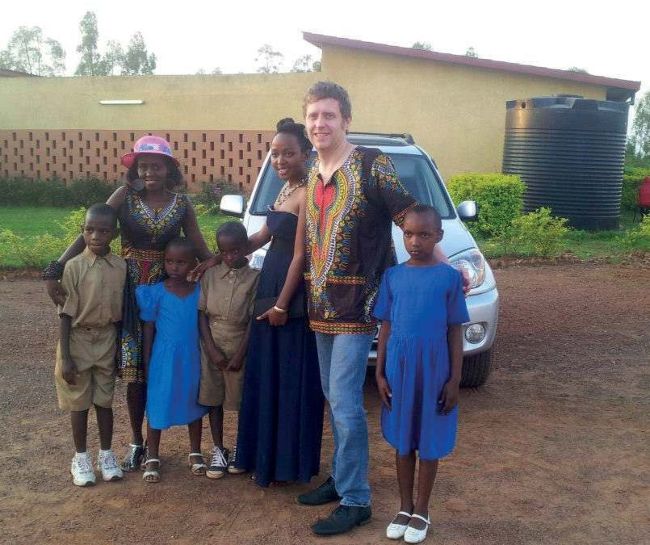
Umutesi Stewart (black dress) and husband Iain Stewart with children at Agahozo
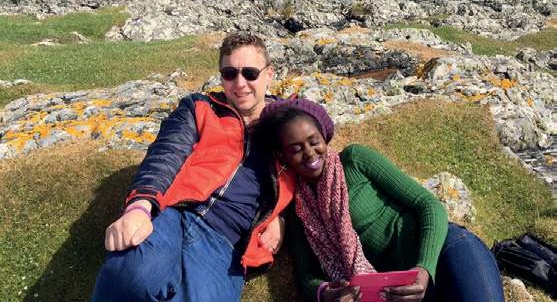
Umutesi and Iain Stewart in Iona
“We followed my neighbour into the jungle. I did not know at that point that my life had changed forever, and that we had just become refugees. We would be travelling for months.
“It was a very dangerous trip as we fled hiding from the militia in the jungles of Congo. I strapped my baby sister on my back and walked with my other siblings into the jungle. Often we would have to hide silently in the bushes as we heard the soldiers gaining on us.
“It was hard going and my little brother just could not keep up.
“He became badly malnourished after several months of walking. I lost track of him as I was watching my other siblings and he fell behind us. When I came back to find him I found that he had been found and beaten to death by the militia. I was heartbroken and I almost wanted to give up.
“I scavenged as best I could, trying to find food for my sisters.
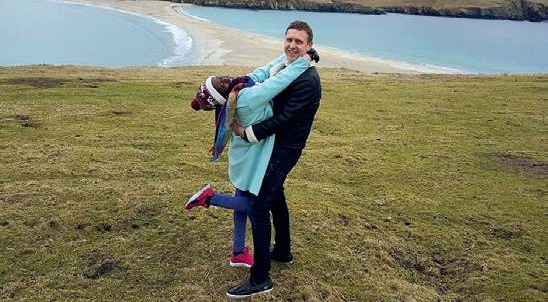
Shetland
“Even when it was hard to find food for my sisters when I felt my baby sister was slowing us down I was determined not to leave them. Our Congolese friend had to leave us in the Jungle to fend for ourselves as he returned home to his village which was a place which was not safe for Rwandan refugees. The Jungle was to become the place where we hid and somehow found a way to survive for several years but it was no home.
“Finally I could take no more. It was no life for us, living on what we could find there to eat, and I decided it was better to go back and die in Rwanda than stay in the jungle. This was no life for my sisters or I. I was not to know that the Rwandan genocide had ended.
“When we returned to our village in Rwanda our family home had been destroyed and over 40 of our relatives had been killed. We were virtually alone.
I was given a room for my sisters and I in a former neighbour’s house. But it was difficult to provide for my sisters. I used my education to get a part time job in order to support them. Later I found a job in Kigali with Compassion International a charity.
They helped me to find a house for my sisters and I but life was very hard. I had to survive on less than £80 a month. I was lucky to meet a German researcher who I helped with her medical research in Rwanda who sponsored me to complete a nursing degree. I am indebted to her for her help. But it was hard to study and work to support my sisters at the same time.”
It was round about then that life took an unexpected turn for Umutesi, and set her on course for a new life in Scotland.
“I used to love the music of two musicians, Iain Stewart and Jean Paul Samputu. Jean Paul is one of the best known, most decorated musicians in Rwandan history. Being a survivor as well, his experience has shaped his music. Iain had joined with Jean Paul to record songs to raise money to help those affected by the genocide. The pair of them were becoming quite well known.
“They were recording songs with orphans from the Aghazo Shalom school. I so loved the message in the music and couldn’t believe that people had come to Rwanda do to what they were doing. I wanted to contact Iain to tell him how much I loved his music. I had never heard songs like Iain had recorded. His songs were like prayers, they offered a message of hope and spoke to so many people in Rwanda.
“I managed to find him on Facebook and we started chatting. We were talking for a long time when one day he came to visit a school where I was working, giving inoculations to the young children there. He was recording a music video nearby, so naturally I jumped at the chance to finally meet.
“It became clear shortly after, that we had developed strong feelings towards each other, and I knew I was falling in love. Luckily, Iain was too.
“Our communication grew more regular and after over a year of skyping and messaging every hour of the day we decided to get married in September 2014.
“We had a simple registry wedding in Kigali. We did not have time to do the big Church wedding and other pre-wedding rituals which are famous in our culture.
“These include a week of introductions to my whole family, where Iain should present many cows as part of his dowry to the head of my family.
“We are determined that we will do that in the near future!
“I hadn’t realised the impact our wedding would have!
“Our wedding captured all the news in Rwanda not only because Iain was a wellknown musician in the country, but because he was wearing a ‘skirt’ as others thought. No one had seen a man in a kilt before! The children stared in amazement.
Our wedding made all the newspapers and I remember the night after our wedding being interviewed with Iain about our wedding and Iain’s music on a live entertainment show the next evening. It was all surreal.
“When I was a child, struggling to survive in the jungle, I could not have imagined such a thing.
“Shortly after coming to Scotland in May 2015 Iain asked if I was comfortable to share my story of what had happened to me. I had not done it before but I felt it was something I needed to do not only to help others but I felt it could help me to come to terms with had happened to me.
“When we returned to our village in Rwanda our family home had been destroyed and over 40 of our relatives had been killed. We were virtually alone.”
Iain had put together a programme in Belfast with an organisation called Craic NI to bring young Catholic and Protestant children together from either side of the peace wall to learn from Iain and Jean Paul’s music and from testimonies of Rwandan survivors. I could not believe that in Europe people could be divided and even kill each other around tribal/ religious grounds as they had in Rwanda. It was hard for me as an Anglican to see how people could hate each other because of the branch ofChristianity they followed. This was not a problem we had in Rwanda. The young people appeared to be greatly moved by our workshops. They could see similarities between how people had been divided in Belfast and what had happened in Rwanda.
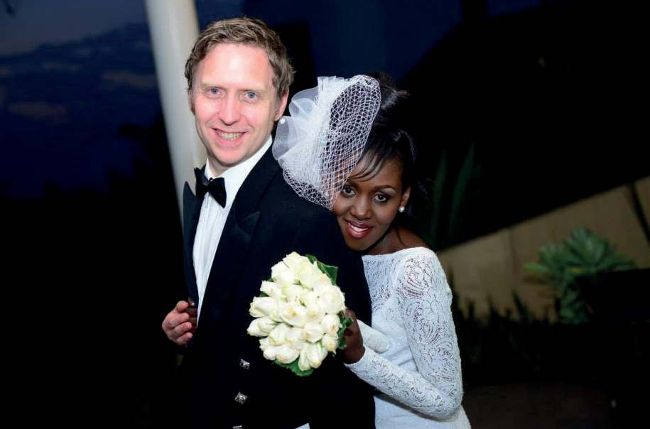
Umutesi and Iain’s wedding.
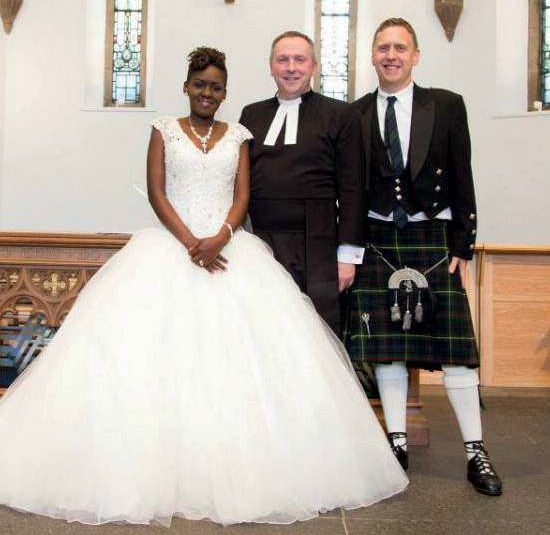
Umutesi and Iain’s wedding.
I feel my story and the stories of other survivors has much teach to other countries and peoples. I always say: ‘We must not become slaves of our past.’
We must learn from it and teach others. Young people are the hope for the world yet in Rwanda they were used as tools to kill others. It was easy to convince them to take part in the genocide. So it is really important to teach others from our experience in Rwanda so that they can recognise the dangers of hate and prejudice and be encouraged to stand against it.”
Umutesi laughs. “One of my funniest memories of Iain was during our civil wedding. He read his vows in my country’s language, ‘Kinyarwanda.’ There were five other couples being married and Iain read his vows better than some of the Rwandese people. People were so amazed and started cheering.”
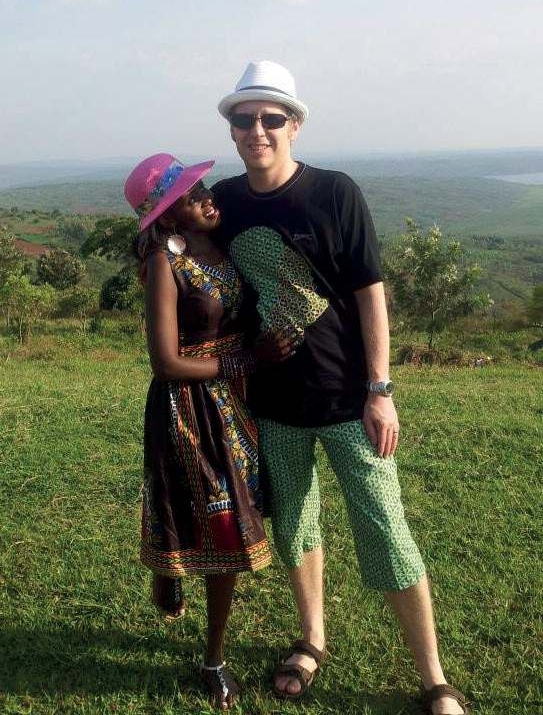
Umutesi and Iain at Agahozo
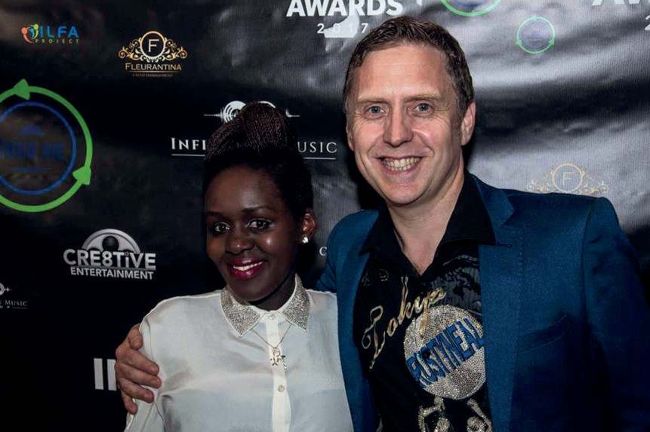
At a music awards event
Iain smiles. “I always say to people that I am lucky that my wife is both my best friend and my most inspirational person. To this day I cannot comprehend what she has been through. She has such inner strength and courage. Her sisters owe their lives to her and they, like me, greatly admire and love this amazing person.”